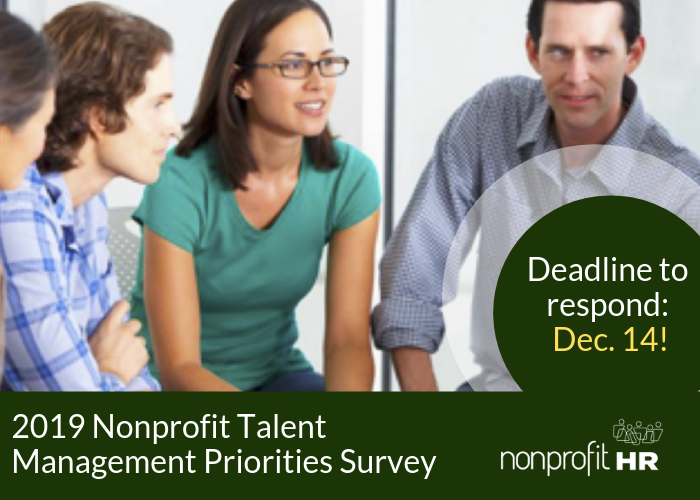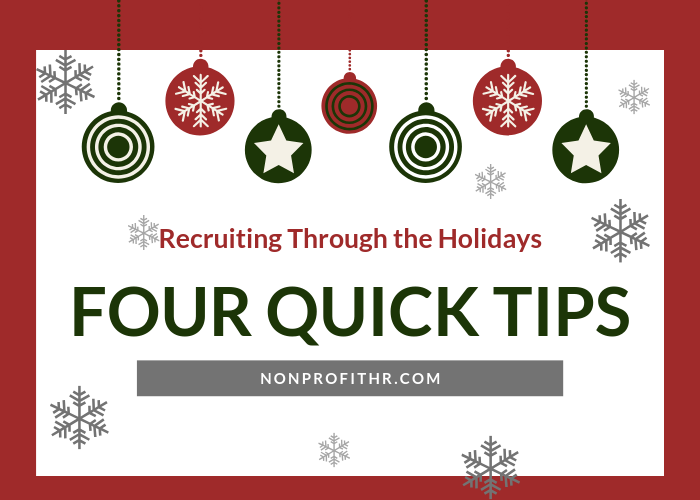WTOP: 5 ways nonprofits can…
by Aaron Brown
The pressing need for corporate brands to develop socially responsible business practices means that for-profit recruiters may now be swimming in your favorite candidate pools. Attracting today’s socially conscious job candidates has inspired many for-profit brands to promote their mission and social responsibility objectives during the hiring process. The growing Millennial workforce, which consistently ranks pay and culture as key career drivers, has contributed greatly to this shifting approach in talent acquisition. In fact, a2018 Deloitte Millennial Surveycited pay (63%), culture (52%), and flexibility (50%) as top priorities when considering a new employer.
With greater focus being placed on company mission and culture brings new priorities for nonprofit management professionals hoping to attract talent and retain staff. Therefore, it is important that nonprofit organizations continually assess how their organization’s recruitment program measures to others, both in the social and for-profit sectors. Whether you are considering targeting K-12 demographics or extending the use of technology throughout the screening process, it is clear that creativity is required in order to maintain a competitive edge among ideal candidates that can help you move your organization’s mission forward.

Dyson– K-12 College Approach
Best known for its high-tech vacuum cleaners, Dyson offers one of the most modern hiring strategiesin their industry. Rather than recruiting potential candidates directly out of college, Dyson starts early and plucks potential employees out of high school, training them along the way. The aspiring engineers work towards their bachelors degree while receiving hands-on experience at Dyson’s research and development facilities, potentially setting them up for a lifetime of success at Dyson.
This practice correlates positively with Nonprofit HR’s 2018 Talent Management Priorities Survey, as 38% of social sector organizations surveys identified “Developing a learning and development strategy program” as a priority.
Xyngular– Employee Vetted Approach
This startup health and wellness company relies on its vast internal network to recruit potential employees. By trusting current employees to screen new applicants, the company continues to build on its foundation of community and support.
This practice does not positively correlate with Nonprofit HR’s 2018 Talent Management Priorities Survey, as only 11% of social sector organizations identified strengthening internal capacity around interviewing skills and practices.
Zappos– Online Chat-Driven Screening Approach
This online shoe company breaks tradition by not posting regular job openings. Instead, Zappos takes a more unconventional routeby choosing to screen potential employees through online chats. If the screener hits it off with the candidate, the applicant is flown to the Las Vegas headquarters for a series of meet and greets. These activities are all designed to learn about the candidate on a more personal level to determine job compatibility. However, the in-person interview takes place after a cultural fit phone interview.
Focusing on cultural fit does correlate positively with Nonprofit HR’s 2018 Talent Management Priorities Survey, as 34% of social sector organizations identified improving organizational culture as a top engagement priority. Another 31% of respondents believe focusing on organizational culture as a whole is also a priority.
In addition to the innovative talent management approach employed by a growing number of organizations, such as the examples above, the recruiting process itself is evolving. Artificial intelligence is expanding into all work fields, including human resources. Some of the highly anticipated developments to come consist of improved online applications, faster and efficient selection processes, enhanced candidate targeting, and more effective sourcing and advanced data analytics.
Nonprofit HR has made great strides to stay on top of this wave. A new survey is underway which will identify social sector talent management priorities for 2019. Results will be revealed next spring, but you can see past years’ surveys here.
What does all of this information mean for your organization? Ultimately, you may see less resumes for your mission-critical roles if your organization does not refresh its talent acquisition programs. Keeping abreast of key HR trends and issues will become increasingly necessary to maintain a competitive advantage. Many businesses needing added or specialized HR support are challenging standard hiring practices by outsourcing their human resources departments. Do not let your organization miss any opportunities to stay ahead of the game and advanced its recruitment strategies.
Aaron Brown
Talent Acquisition Consultant
Contact Aaron directly!
Email: [email protected]
Phone: 202.644.7443





























